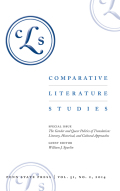
Special Issue: The Gender and Queer Politics of Translation: Literary, Historical, and Cultural Approaches
Special Issue of Comparative Literature Studies Volume 51, Number 2, 2014
Guest Editor: William J. Spurlin
Introduction The Gender and Queer Politics of Translation: New Approaches pp. 201-214 William J. Spurlin Articles A Queer and Embodied Translation: Ethics of Difference and Erotics of Distance pp. 215-230 Aarón Lacayo “Homme” peut-il vouloir dire “Femme”?: Gender and Translation in Seventeenth-Century French Moral Literature pp. 231-252 Pierre Zoberman Strategies of Translating Sexualities as Part of the Secularization of Eighteenth- and Early Nineteenth-Century Russia pp.
